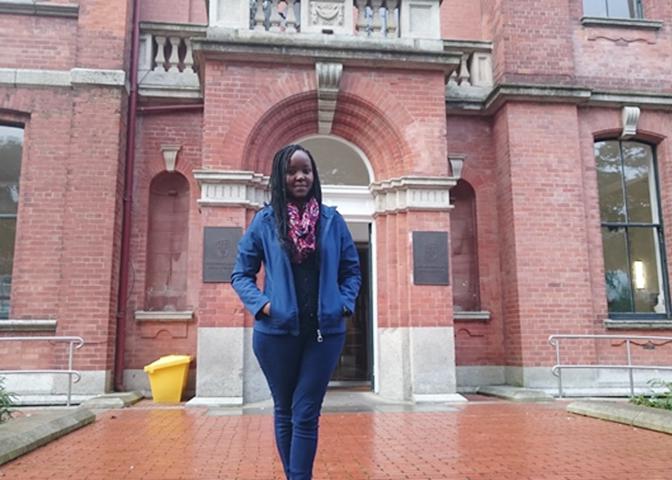Joanne Muchai
(Kenya)
Master of Business Administration, University College Dublin
In 2016 Joanne Kawira Muchai decided to take a step back from her managerial role at a catering company in Kenya to avail of a Mwangi Scholarship. This opportunity allowed her to travel to Ireland for one year where she would in enroll to do a Master of Business Administration at University College Dublin, Michael Smurfit Graduate Business School.

The greatest benefit has been learning to think outside the box. The classes push you past conventional methods of thinking. Rather, as a business person operating within a complex economic market, they encourage you to think of the non-obvious options that I could take which could set myself apart from others and give my business an edge.
In Kenya I co-managed a catering business called Gourmet Link. It was a family-run business that I entered when completing my undergraduate degree. I was fortunate enough to have a significant hand in the day-to-day operations of running the business and was given a lot of decision-making powers. However, I was driven to make the business not only thrive, but to also grow. Being a key stakeholder in the business required me to wear many different kinds of hats from chef, to marketer, to accountant. I realised I needed more formal training and believed that with the right business degree, I would not only advance my personal learning, but I would increase the value of the company as it stands to benefit from the expertise that I would gain.
I'm so happy to be a recipient of this scholarship and to have the opportunity to study at UCD. The course has been amazing. So far, the greatest benefit has been learning to think outside the box. The classes push you past conventional methods of thinking. Rather, as a business person operating within a complex economic market, they encourage you to think of the non-obvious options that I could take which could set myself apart from others and give my business an edge. Additionally, I value the insights and wealth of knowledge the lecturers and my classmates bring to the course. By sharing their experiences, I've been able to bounce ideas off of them and expand my understanding of business areas (such as the stock market) that I previously knew little about.
The overall course is very well-structured. It incorporates practical experiential learning into the curriculum in creative and innovative ways. For example, we have three international trips to take where we will visit companies in Japan, South Korea and Iceland to learn about their business culture and business approach. Our largest assessment is the capstone project. For this project, we are given a list of real companies that require actual, time-bound solutions. A company may present us with their challenge (e.g., ‘We are thinking of expanding into China, India or Russia; which of these options should we pick and why?’), and we will be required over a two-month period to generate recommendations based on site visits, investigations and research. Thus, we're being tasked to find real solutions for real businesses.
I am certain that my studies will have a really big impact on my work when I return to Kenya. I know my work will be a lot more organised. In this course I'm learning about different kinds of systems—accounting systems, human resource systems, and the like. I know that when these kinds of formal structures are in place, it is easier to move things along in your company because you're acting strategically and no longer 'shooting in the dark'. However, the biggest lesson that I've learned so far is that I am capable of managing a lot more than I thought I could. I've also received encouragement from lecturers who also say, ‘You're capable of doing so much more’. I'm looking forward to going home and scaling things up. I think I will be responsible for a lot more and I will be aiming higher. That will be the biggest impact.
Being on the course has opened my eyes to other areas that have potential to be developed. A big hope of mine is that Kenya becomes a place that incorporates structures that make it easier to do business. I've been observing how things are done here in Ireland and think a similar model could be applied to Kenya. For example, during Global Network Week at UCD I learned how central a role agriculture is to the Irish economy, and how Ireland has positioned itself to be very competitive in that area—particularly in the beef industry. There were a lot of parallels that I could draw between Ireland and Kenya and realised that we could be doing similar things in our economy—especially in the tea and coffee industries. I've learned that the size of your country doesn't have to dictate the wealth of your country.
For me, the course has also sparked ideas and interests in other related fields. Kenya attracts a lot of tourists for its wildlife and natural beauty; however, I think that the Kenyan tourism industry can improve its quality of service. We could benefit from better trained staff and better systems of management. The only way for that to change is to have proper education and proper training for people working in that sector. Perhaps one day I will be able to utilise my learning in Ireland to develop an education programme that is tailored to the needs of the Kenyan tourism sector.
I find that I'm generating new and exciting ideas as a result of being on this course. I would advise other Kenyan young ladies to apply to this programme—it is possibly the best decision you'll make. Coming here to Ireland has been an experience I can't quantify. I've met people from across the world, I'm being given travel opportunities that I otherwise would not have had, and the knowledge that I've gained from lectures and classmates will benefit me for life.